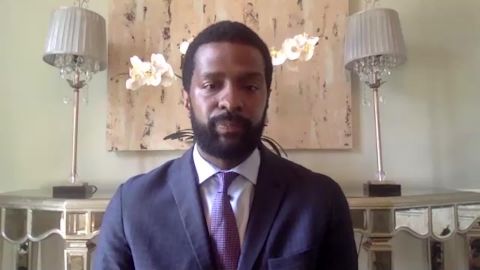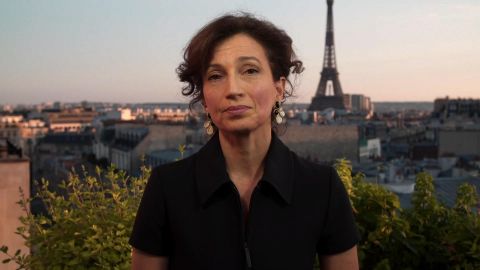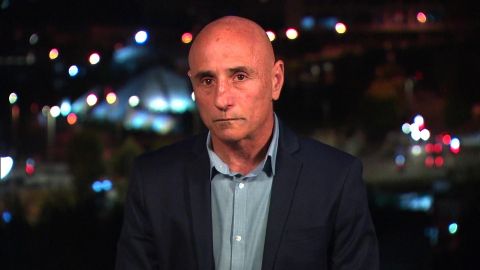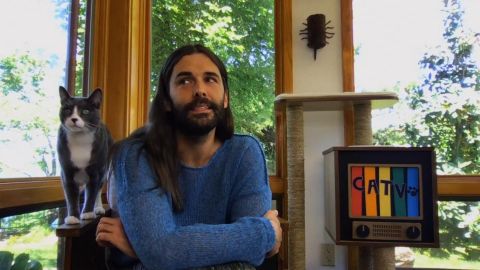Read Transcript EXPAND
CHRISTIANE AMANPOUR: Well, our next guest, the attorney general, former state legislature and political commentator, Bakari Sellers, argues that it’s not that simple. He tells our Michel Martin what he thinks the surgeon general got wrong. And they discuss his new memoir, “My Vanishing Country: About Being Raised in South Carolina as a Child of the Civil Rights Movement.”
(BEGIN VIDEO TAPE)
MICHEL MARTIN, CONTRIBUTOR: Mr. Sellers, thank you very much for joining us.
BAKARI SELLERS, CNN CONTRIBUTOR, AUTHOR, “MY VANISHING COUNTRY: A MEMOIR”: Thank you very much for having me. It’s an awesome opportunity.
MARTIN: So, let’s start with the op-ed that you wrote for CNN last week. It was directed at the surgeon general, Dr. Jerome Michael Adams, who is encouraging African-Americans and Latinos, in particular, or so it seemed, to embrace healthier habits, particularly in the wake of the COVID-19 pandemic, which seems to be hitting these communities hard. And you took issue with what he had to say. I mean, he said, you know, things like common sense things like, you know, don’t smoke, don’t take illegal drugs, things of that sort. What’s your problem with that?
SELLER: Well, I felt as if his analysis was very superficial (INAUDIBLE). And when we look at COVID-19 and we look at the mortality rates that we see in black and brown communities, we can’t look at those things in a vacuum and in isolation. We actually have to examine the institutionalized and systemic racism we have in this country. I’m from Denmark, South Carolina, and I like to use that as an example. You can’t go two miles and find a healthy or fresh food alternative. That means that individuals have to go and they are considered to be in food deserts and they may have to go and get unhealthy alternatives, which lead to these preventable illnesses, which we know will lead to high mortality rates. In black and brown communities, you’re breathing in unhealthy air from the manufacturing plants or the brown fields that are very close by, which lead to things such as asthma. In Flint, Michigan and in many black and brown communities, you still don’t have access to clean water, which means you’re more likely to have these “comorbidities.” And so, until we have a holistic discussion about the racism and the system of oppression that is prevalent in everyday society, that we see particularly in the poor, rural south, you know, the most amazing part about these numbers that we see, the most tragic thing is that the state with the highest death rate is Alabama. The highest death rate. It’s fourth in terms of numbers, but it has the highest test death rate, the majority of which are black and brown. And the reason being is because of the underlying poverty and the underlying symptoms of oppression we have. I thought the simple fact that General Adams was saying, you know, do it for your meema (ph) and do it for your papa, was below and underneath the surgeon general. And he was in a position because he’s the lone African-American in that room to speak up and have a holistic conversation about the pervasive systems of injustice we have in this country.
MARTIN: A lot of people became acquainted with Denmark, South Carolina, because of the primary race, the Democratic primary campaign, where a number of candidates pointed out, something that you pointed out before, when you were in office over there, which is a lot of people don’t have access to clean water. Why is it that in this century, a community in the United States, what is it, like half an hour from the state capital, where people don’t have clean water, why is that?
SELLER: Well, so, I mean, I think that when you look at it again, look at it holistically. When I grew up, we just found out that our water had been contaminated with a mineral which should not be used to clean wells. And was placed — the state placed it in our water wells and it’s not suitable to drink. There’s actually a class action lawsuit filed right now on behalf of the citizens of Denmark, trying to get them clean water. I just mentioned food deserts, as well. But also, it’s a lack of access to care. When I grew up in 2010, we actually lost our hospital. So, imagine living in a community where you’re in a food desert, where you’re drinking unclean water, where you don’t have a hospital, where you — the closest hospital you can go is 30 to 45 minutes. We’re talking about virtual education, virtual schooling where many of the citizens in Denmark, South Carolina, and throughout the poor rural south don’t have access to broadband. You can’t — there’s not a virtual school component that they can utilize. And then you have 98 percent of the kids are on free and reduced lunch, 90 percent plus. And so, you just overlay these layers of oppression and it gets really difficult to breathe, figuratively. But when you have a pandemic — and my father pointed this out to me. He’s seen a lot. In February and March, he acknowledged that black people are going to suffer more than most. It goes back to the age-old theory, which I’m sure you’ve heard and your grandparents and parents told you, which is that if America gets a cold, black folk get pneumonia. And we’re starting to see that. As the country gets sicker, black folk seem to be bearing the brunt of that illness. And it’s a shame, because now these red state governors, my governor included, Henry McMaster, and Brian Kemp, now want to reopen government. But even when we had the opportunity, like General Adams, to address these inequalities, we refuse to.
MARTIN: Why do you think that is?
SELLERS: With Donald Trump being president of the United States, and a lot of people picking at the wound that race is, and now with COVID-19 — and we have the data showing that this is not — we’re not playing the race card. I actually hate that phrase. I am black. I’m not playing a card. I’m actually telling you about my humanity. But we’re actually seeing the results and seeing the results of these structures that we have in this country, but this is a difficult conversation to have. It’s a conversation that most people do not want to have. But when you look at Denmark, South Carolina, where I’m from, and you talk about the lack of access to care, you talk about the food desert, you talk about the fact that it’s in the Corridor of Shame, you talk about the fact that it’s along the Stroke Belt, where you can talk about preventable illnesses, you overlay it with the pandemic, now we’re yelling and screaming, saying, this is the time to address this issue that America doesn’t want to talk about.
MARTIN: Tell me a little bit about the situation in your state, in your home state of South Carolina. What’s going on in there?
SELLERS: So, the governor just recently reopened retail stores, because he’s now deemed things such as tattoo parlors and beauty salons and barbershops as essential. These small businesses will now be reopening. And one of the things that I think about more so than anything else is, individuals — my daughter is immunosuppressed. She actually had a liver transplant on September 1. I just think, if I was a situation where I was working at one of these businesses and my boss called me back into work, knowing that I have an immunosuppressed daughter at home, and I said no, let’s say I — my boss said, either you do it or you quit, and I quit that job, I’m not even entitled to unemployment benefits. I would be out of work because I — my governor put me a position where I had to make a choice between the health and safety of my family or going and making a livelihood, which I don’t think is a choice at all. I think that we can responsibly talk about opening up government, but we also have to talk about public health. And one of the things that this pandemic has taught us that we need to start talking about bold structural changes to our democracy, things such as UBI that Andrew Yang always talks about or a national jobs guarantee in raising the minimum wage, so we can alleviate that doldrum of poverty that exists in our country.
MARTIN: One of the other reasons we wanted to speak with you is that you have just written a memoir.
SELLERS: Yes.
MARTIN: It’s coming out very soon. It’s called My Vanishing Country.” Why that title?
SELLERS: You know, you know, for me, I look at things through the lens of the civil rights movement. I’m a child of the movement. My father was in SNCC. He was shot in the Orangeburg Massacre on February 8, 1968. He was subsequently imprisoned as a result of that night’s violence. And from 1968 and the Orangeburg Massacre to the Charleston massacre in 2015, I always say that my life has been bookended by tragedy. When I was standing in front of the church, Mother Emanuel, about 10 days after the shooting in Charleston, I did an interview. And I was sitting there. And I was thinking to myself and said out loud that my father was 70 at the time and I was 30 at the time, and we were having many of the same shared experiences. The reason being is because the country that we had begun to see, that my father’s grandfather and grandfather’s generation, a bubbling economy, that the hard work that paved the way for the Voting Rights Act and the Civil Rights Act meant that we were on this pathway for what I believed to be hope and love and truth and justice and peace. And I just think that, over my lifetime, we have begun to see that dissipate. March was the first month since 2002 that we have not had a school shooting in the United States of America. And that’s because schools for the most part were out. When you talk about what it means to grow up in this country today, I have a son named Stokely. He’s one of my twins. I have twins 15 months old. And Stokely, named after Stokely Carmichael, well, I’m still afraid that when Stokely goes out and he has his first interaction with police, that — that petrifies me. That terrifies me. Even more importantly, I’m worried that if we’re not prepared for the next pandemic, for example, Stokely’s classmates, who rely on the lunch program at school, like many kids do now, if we have to close schools down, won’t be able to eat. You know, I went to schools where that was the case. And so the country that I want to believe in, the country that I work so hard for, the more perfect union that I live my life for, some days, we believe, is vanishing before our eyes.
MARTIN: Your memoir is fairly moving, telling the story of your father, Cleveland Sellers, who was a very important movement activist, who was, as you just told us, shot in the Orangeburg Massacre, which was one of the traumatic events, still commemorated to this day. If you go to the campus of South Carolina State, you will see a memorial to the three young men who lost their lives that day. And it is understood now that perhaps your father was one of the intended, you know, targets of the shooting. So you grew up with this kind of backdrop of trauma. And you’re very honest about the effect that this trauma has had on you. On the other hand, we look at your life. I mean, you were the youngest African-American elected lawmaker in the country. You started planning your campaign when you were still a college student. You beat a 26-year veteran, as a 22-year-old just out of school. I mean, a lot of people would look at your life and say, you are nothing but the embodiment of hope. So why do you seem so pessimistic?
SELLERS: I don’t know if it’s pessimism or the fact that I still understand that we have made progress in this country, but we still have yet a ways to go. It’s a belief that we have to work just as harder, if not harder, than the generation before. We owe them that. We stand on their shoulders. And so to reclaim that more perfect union, so that my kids can one day be free, I have to work just as hard. That burden is difficult sometimes, because, just as my father kept a picture of Emmett Till in his wallet when he was coming along, and lived for Emmett Till, for me, I live for the Michael Browns of the world, the Keith Lamont Scotts of the world, the Clementa Pinckneys of the world, the Blands — or the Sandra Blands of the world. because that is my burden that I carry. And it’s one that gets difficult sometimes. But the joy that I get does come from the fact that I am raising a family. I have a beautiful wife and beautiful children. And I have to do it for them. And I still believe in what Abraham Lincoln called the better angels of our nature. But every single day, I’m going to fight so that individuals give black and brown folk in particular and poor folk the benefit of their humanity in this country. And I think that what you see in Washington, D.C., today is not emblematic of the country that I want to live in.
MARTIN: You know what’s fascinating, though, about your story, though, is your family is very distinguished, very accomplished, your siblings, you know, all of your parents, trailblazers. But you still experienced a lot of the phenomena that African-Americans experience. I mean, your wife almost died in childbirth. You know, your father was incarcerated. You have all of these strains in your life that encompass so many of the aspects of the African-American experience. And it just seems almost like a — I don’t even know how to say it, like a head-snap in a way.
SELLERS: We have a saying to some of my friends who get wayward that this country has an interesting way of reminding you that you’re black.
MARTIN: Get wayward, that’s an interesting suppression.
SELLERS: Yes. And, for me, one of the reasons I wrote this book is people have this fear of having this discussion about race. And I just wanted to write it and write it from my perspective and write it, even more importantly, in my truth. As I was finishing up the book, we were giving birth to Sadie and Stokely – – not we — my wife was giving birth to Sadie and Stokely. And, yes, it was — she almost died. She lost seven units of blood. They say her body only had about nine units total. The first 36 hours of my twins’ life, their mother was in ICU, and I was giving that prayer that sometimes you give when you get knocked down, which is, dear lord, if you get me through this, I swear I will never, ever do X again. And it was the toughest moment of my life. And when we went back and looked at it and studied it, we realized that it didn’t matter if you were Serena Williams, or Ellen Sellers, or you were poor in this country. African-American female mortality is an issue that affects us across socioeconomic classes. And the reason being is because of many of the implicit biases and, just plainly speaking, the — race, the issue of race in this country. And black women simply — like in a lot of things, unfortunately, their voices simply are just not heard. And I had to be my wife’s advocate. And I’m just thankful I was strong enough to do that.
MARTIN: One of the things that occurred to me as I was reading your book is that a lot of the coping mechanisms that a lot of people of color have traditionally relied upon are not available in the current moment. You know, you can’t go to church in most places safely. You can’t go to the barbershop or the beauty shop, at least not safely, right? And, you know, a lot of the strategies that a lot of other communities are employing, like having online church services or whatever, that’s not what a lot of folks do.
SELLERS: One of the things that I talk about is the fact that there’s so much comfort in those church lady hugs. Those are the ladies who sit in the front row of the church and wear the big hats. And they make the good sweet potato pie and coconut pie. And when they give you a hug, it’s as if your shoulders drop and all your worries go away. And you can’t feel that right now. There’s no greater therapy for a black man than sitting in a barber’s chair and just talking about the world. We’re lying about half of it, but it still feels good to talk about it, right?
(LAUGHTER)
SELLERS: And not having those things, you’re right, it’s very difficult. And so I challenge people, as we go through this, to come out of this physically, emotionally, spiritually and mentally stronger than you were. And that takes a lot of work. And that means spending a lot of time with yourself, but also spending a lot of time with your family and talking about things that are bothering you and dealing with them. We all should be dedicating ourselves to at least talking about the problems that are going through our head.
MARTIN: Bakari Sellers, thank you so much for talking to us.
SELLERS: Thank you so much for having me.
About This Episode EXPAND
Chrisitane speaks with Ofer Shelah about how COVID-19 has affected politics in Israel; Audrey Azoulay about how cultural life around the world can still flourish; and Jonathan Van Ness about coping strategies under lockdown. Michel Martin speaks with Bakari Sellers about why the black community has been disproportionately affected by coronavirus.
LEARN MORE



